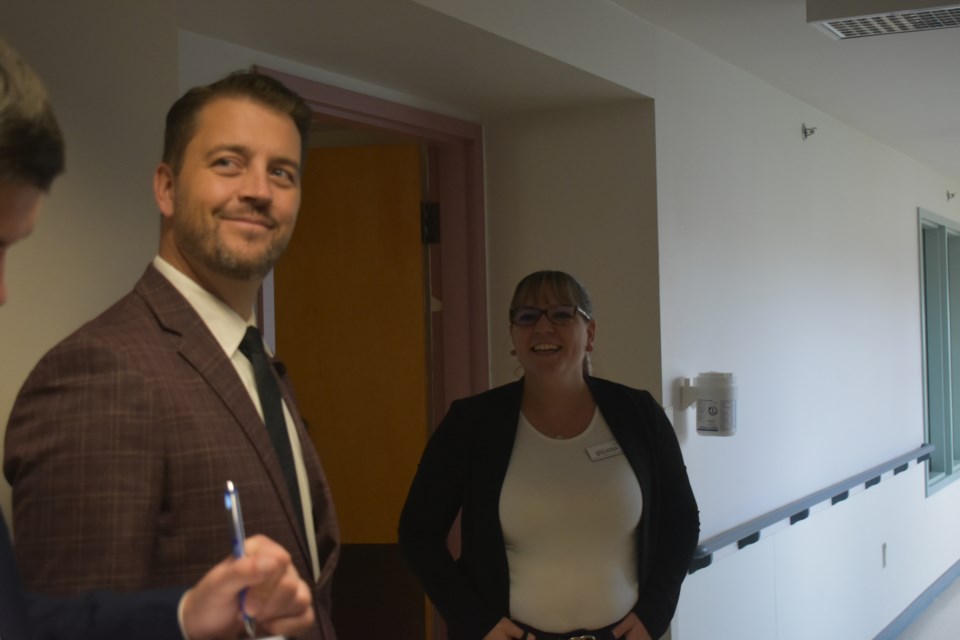KAMSACK — Kamsack health professionals emphasized staffing shortages, healthcare technology and access to care to the province’s new rural health minister as he toured the local hospital.
Tim McLeod, the minister of mental health and addictions, seniors, and rural and remote health toured the Kamsack Hospital on Oct. 2 with Kamsack Mayor Nancy Brunt, MLA Terry Dennis, local doctors, and health administrators.
One of the primary concerns raised during the tour was the ongoing staffing shortages faced by healthcare facilities in the area.
Tracy Gulka, a licensed practical nurse, highlighted the difficulties in maintaining adequate staffing levels. She pointed out that the shortage of nursing staff has led to the need for 12-hour shifts and the utilization of contract nurses to fill the gaps. It was also noted by Gulka that this shortage has persisted over the last few months, and efforts are underway to recruit more staff to address the issue.
The tour also touched upon the importance of modernizing healthcare technology. Participants highlighted the inefficiencies caused by the continued reliance on paper records and outdated systems. They emphasized the need for a more integrated and digital healthcare information system that would facilitate better co-ordination of care and reduce the risk of information being lost or delayed.
One of the notable areas of concern was the reliance on contracted staff due to staffing shortages. While contracted staff can provide temporary relief, participants noted that securing such staff has become increasingly challenging. This reliance on contract workers could impact the stability and consistency of care provided to patients.
The conversation also touched upon the challenges faced by patients in remote areas when accessing healthcare services.
Megan Crane, the primary health care manager at the Kamsack Hospital, discussed the difficulties faced by vulnerable individuals who may not have access to transportation or a family physician. She said the lack of co-ordination among healthcare providers and the absence of public transportation in the region compounded these challenges. Stakeholders recognized the importance of improving access to care and the need for innovative solutions to address these issues.
“There are lots of people who aren’t attached to a family physician,” Crane said. “When they do come in for a test, duplicate testing is an issue but in Kamsack a lot of times there are no duplicate tests, there's a potential to flag a health issue and it will get missed.
“A follow-up visit with a practitioner at a different clinic or different emergency room is just not going to have access to that information, and their clients won't know that.
“Getting our information in one place versus trying to get the client to all the different locations and all to have them be able to advocate for every test would be a really big shift. A lot of our clients who are vulnerable are just not in a position to be maintaining their health records.”
Another key point of discussion revolved around the limited availability of healthcare services in the area. The healthcare leaders acknowledged that while there are physicians in the region, they are often stretched thin, serving in emergency rooms and long-term care facilities. The need for nurse practitioners to complement the physician workforce was emphasized as a way to provide comprehensive care to the communities.
Stepping Stones Wellness Clinic serves the Indigenous communities of The Key, Cote, and Keeseekoose. Crane said they’ve done a lot of work building relationships in the last year. She expressed the organization's commitment to move into service delivery that addresses the specific needs of these communities.
“When I look at it, just from the Stepping Stones Wellness Clinic perspective, we definitely have the physicians but unfortunately, those physicians are long-term care physicians so they can't be everywhere at once. That's why the nurse practitioner positions are a big part of Stepping Stones Wellness Clinic and that's our hope, to build that nurse practitioner portfolio to really meet people where they are in the community.”
After the facility tour concluded, McLeod, Brunt, Dennis among others went into a private meeting.
Dr. Johann Roodt, the physician executive for Integrated Rural Health in Saskatchewan, had just finished touring the facilities and spoke with the local health administrators and nurses. He reflected on past visits to the hospital.
“From last year, we've made quite significant progress in terms of recruitment and some retention of new staff coming in. I can certainly see the passion and commitment from our SHA team and our staff members on the ground.
Roodt said he was thankful for McLeod’s visit
“We know that we still have a way to go to stabilize services in the community of Kamsack. Thank you to everyone, you know, on the ground, all the way up through to the minister's office for all the effort that's going into stabilizing our services and rural health care. [We’re] just very appreciative of everybody's efforts.”




